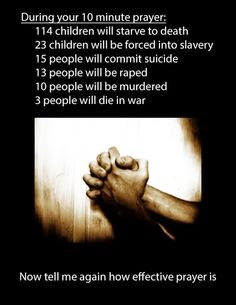I wonder how long most prayers last. Ten minutes seems excessive. I'd guess most don't last more than a minute or two. Even the more elaborate ones I remember hearing in church never lasted longer than that. And regardless of their length, they all accomplished the same thing: nothing whatsoever.
Okay, maybe that isn't completely fair. They might have sometimes made the person doing the praying feel a little bit better for a short amount of time. Maybe that is something. But they certainly didn't bring about any sort of divine intervention, and I think that most of those doing the praying realized that this was going to be the case. At least, they acted like it was the case. And I suppose if they were correct about the existence of their gods and about how their gods work, we'd have to expect that prayer is not going to bring about anything of the sort. No, the best they can hope for is a brief respite from reality.
Many atheists criticize prayer for leading to inaction. I don't think that prayer always leads to inaction. At least, I see no reason why it must always do so. Someone could utilize prayer to briefly collect his or her thoughts and then set about the task of doing something meaningful in the world. And yet, prayer does often seem to lead to inaction. It is something many people do - or at least claim to do - as an alternative to aiding others. And that is unfortunate.
But in the end, this is not where my objection to prayer rests. I do not even take issue with religious believers who want to pray. If they wish to utter magic incantations instead of taking part in meaningful action, this is their right. I might criticize them for exercising it, but I recognize their right to do so. My objection is that they cannot seem to resist imposing their prayer on others where it does not belong. Too many Christians seem to have little interest in prayer unless it is a public spectacle others are made to witness. I do not wish to be involved in their exercise of religious freedom. When they insist on involving me against my will, we have a case where their exercise of rights violates my own rights and/or the separation of church and state. And this is where the problem begins.
Religious believers should feel perfectly free to practice their religion in their places of worship and their places of residence. They should feel free to silently pray over their meals in public restaurants, at work or school, or wherever else they like. And when they can do so without becoming a public nuisance or violating the law, they are even free to loudly shout their prayers at passersby on the street. But when the prayer is not silent and when I cannot leave without penalty, I am going to object. The right of a religious believer to practice his or her religion does not extend to involving me in his or her practice against my will.
